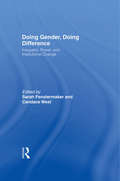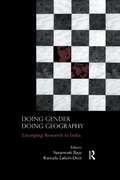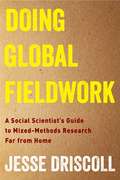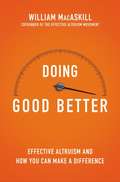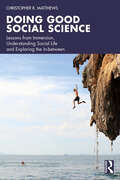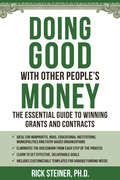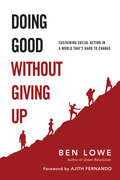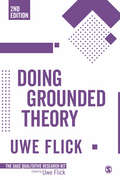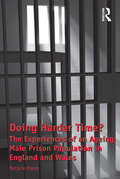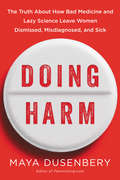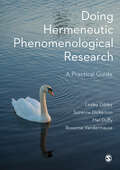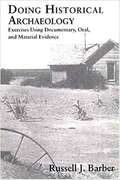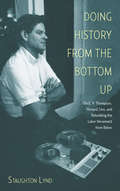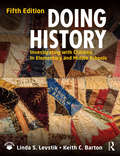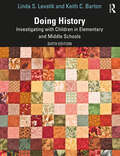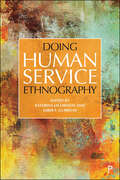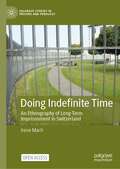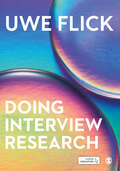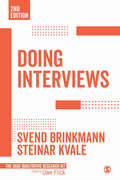- Table View
- List View
Doing Gender, Doing Difference: Inequality, Power, and Institutional Change
by Sarah Fenstermaker Candace WestFor the first time the anthologized works of Sarah Fenstermaker and Candace West have been collected along with new essays to provide a complete understanding of this topic of tremendous importance to scholars in social science.
Doing Gender, Doing Geography: Emerging Research in India
by Kuntala Lahiri-Dutt Saraswati RajuUntil the 1970s gender had been invisible in analyses of social space and place in the androcentric discipline of geography. While recent contributions to feminist geography have challenged this, in India the engagement of geographers with gender, by being conservative in its choice of focus and orthodox in methodology, has been unable to destabilise the established disciplinary order. However, with younger scholars becoming increasingly interested in studying gender in geography, novel and innovative methods that include combinations of quantitative and qualitative analyses, visual sources and in-depth case studies are being tried out and accepted in geography despite its masculine legacy. This pioneering study brings together Indian geographers’ contributions to understanding gender, and through them, seeks to enrich the discipline of geography. It engages with the recent ‘spatial turn’ in the social sciences, which has reclaimed the explanatory power of space and place in social theory that had been nearly lost to deconstructive postmodernist scholarship. The volume draws entirely from the Indian scholarship, showcasing contextualised knowledge production, but hopes to initiate a a dialogue with scholars elsewhere working with feminist methodologies.
Doing Global Fieldwork: A Social Scientist's Guide to Mixed-Methods Research Far from Home
by Jesse DriscollTo do quality research, many social scientists must travel to far-flung parts of the world and spend long stretches of time living in places they find unfamiliar and uncomfortable. No matter how prepared researchers think they are, everyone encounters unexpected challenges in the course of their work in the field.In Doing Global Fieldwork, the political scientist Jesse Driscoll offers a how-to guide for social scientists who are considering extended mixed-methods international fieldwork. He details the major steps in fieldwork planning and execution, from creating a plan, to what happens when political conditions throw up obstacles to research, to distilling and writing up research findings upon return. Driscoll emphasizes the ability to improvise and adapt because in the field, ideas will shift, plans will change, and something will inevitably go wrong. He offers a practical overview of the types of psychological and physical preparation, professionalization, and self-presentation that social scientists conducting research abroad need to prioritize. Driscoll describes the challenges that arise when working in difficult settings, such as war zones, areas of contested sovereignty, and volatile nondemocratic states. He explores the practical and ethical considerations for data collection in these unique situations, including whether and how much to reveal about one’s research and common psychological harms associated with fieldwork.Doing Global Fieldwork is an up-to-date methodological guide for graduate students and social science researchers of all stripes who need blunt, no-nonsense advice about how to make the best of their time in the field.
Doing Good Better: How Effective Altruism Can Help You Make a Difference
by William MacaskillMost of us want to make a difference. We donate our time and money to charities and causes we deem worthy, choose careers we consider meaningful, and patronize businesses and buy products we believe make the world a better place. Unfortunately, we often base these decisions on assumptions and emotions rather than facts. As a result, even our best intentions often lead to ineffective--and sometimes downright harmful--outcomes. How can we do better? While a researcher at Oxford, trying to figure out which career would allow him to have the greatest impact, William MacAskill confronted this problem head on. He discovered that much of the potential for change was being squandered by lack of information, bad data, and our own prejudice. As an antidote, he and his colleagues developed effective altruism, a practical, data-driven approach that allows each of us to make a tremendous difference regardless of our resources. Effective altruists believe that it's not enough to simply do good; we must do good better. At the core of this philosophy are five key questions that help guide our altruistic decisions: How many people benefit, and by how much? Is this the most effective thing I can do? Is this area neglected? What would have happened otherwise? What are the chances of success, and how good would success be? By applying these questions to real-life scenarios, MacAskill shows how many of our assumptions about doing good are misguided. For instance, he argues one can potentially save more lives by becoming a plastic surgeon rather than a heart surgeon; measuring overhead costs is an inaccurate gauge of a charity's effectiveness; and, it generally doesn't make sense for individuals to donate to disaster relief. MacAskill urges us to think differently, set aside biases, and use evidence and careful reasoning rather than act on impulse. When we do this--when we apply the head and the heart to each of our altruistic endeavors--we find that each of us has the power to do an astonishing amount of good.From the Hardcover edition.
Doing Good Social Science: Lessons from Immersion, Understanding Social Life and Exploring the In-between
by Christopher R. MatthewsDoing Good Social Science takes readers on a personal and thought-provoking journey and empowers readers to become unshakeable, free-thinking scholars.Drawing from nearly two decades of experience in research and mentorship, this book shares insights gained from creating ‘immersive moments’ to challenge conventional methodology and social theory. In doing so, it integrates ideas from classical and contemporary scholarship across various disciplines, bringing them to life through engaging field notes, interviews, and often humorous examples. The book outlines how to cultivate disciplined and systematic scholarship on complex topics while critiquing the ‘wonky’ practices that often pervade modern academia. Part One advocates for a more scientific approach to social science, offering guiding principles for scholars striving to understand social life. Part Two deepens and complicates these arguments by examining the philosophical foundations of social science, focusing specifically on the ‘in-between’ aspects of the human condition and our social nature. The writing and thinking in the book are distinctive, passionate and brave.This book is a compelling read for advanced students, early career researchers, and any academic seeking to develop a more liberated, inventive approach to methods.
Doing Good With Other People's Money: The Essential Guide to Winning Grants and Contracts
by Richard Steiner<P>The ultimate nonprofit handbook for winning contracts and grant awards.There’s only so much money to go around, and everybody wants it. So, how do you make sure your proposal stands out in the crowd? <P>Doing Good with Other People’s Money includes everything a fundraiser and grant writer needs to know, including: <br>• Insight into why some proposals succeed and others fail <br>• The important distinction between grants and contracts • Templates and questionnaires designed to help you achieve success <br>• How to establish and maintain key sponsor relationships <br>• The most current knowledge and complete grant-winning toolkit <br>• The skills to administer and comply with funded awards <P>Drawing on over forty years of experience working in government, corporations and academic institutions, Rick Steiner has created the ultimate nonprofit resource for winning contracts and grant awards. Whether you’re a small nonprofit startup or a multi-million dollar agency or institution, Doing Good with Other People’s Money is for any organization looking to obtain contracts and grant awards in a competitive environment.
Doing Good Without Giving Up: Sustaining Social Action in a World That's Hard to Change
by Ben Lowe12th Annual Outreach Resource of the Year (Social Justice)
Doing Grounded Theory (Qualitative Research Kit #9)
by Dr Uwe FlickThis short, easy to read introduction to grounded theory will help you to employ the method in your research project. Uwe Flick discusses each stage of the process of doing grounded theory research, including formulating a research question through analysis of data, theoretical sampling, sorting and saturation, data collection, coding and forming theories from data.
Doing Grounded Theory (Qualitative Research Kit #9)
by Dr Uwe FlickThis short, easy to read introduction to grounded theory will help you to employ the method in your research project. Uwe Flick discusses each stage of the process of doing grounded theory research, including formulating a research question through analysis of data, theoretical sampling, sorting and saturation, data collection, coding and forming theories from data.
Doing Harder Time?: The Experiences of an Ageing Male Prison Population in England and Wales
by Natalie MannIn his seminal text Society of Captives, Gresham Sykes discusses the general pains of imprisonment to which all prisoners are subjected: the deprivation of liberty, the deprivation of heterosexual relationships, and the deprivation of autonomy. Sykes recognised that different prisoners experience these pains differently, and as a result, are affected to a greater or lesser degree by their time inside. In this groundbreaking book, Natalie Mann investigates the idea that apart from the general pains of imprisonment discussed by Sykes, certain characteristics which certain prisoners hold makes them more likely to suffer from what she terms term 'added pains', i.e. the extra difficulties, deprivations and frustrations which exist within certain subsections of the prison population. The ageing prison population is a key example of a group who experience added pains of imprisonment. Their weaker appearance, their old-fashioned views and their less able bodies are all factors which result in them experiencing extra problems within prison. It is these added pains and the ageing men's experiences of them, which this book addresses. Framed within the theoretical perspective of structuration theory, but also drawing on aspects of Goffman's interactionism and Bourdieu's concept of habitus, this book offers a unique interpretation of research carried out with ageing prisoners and their prison officers and shows the reality of prison for those who are reaching the end of their life course.
Doing Harm: The Truth About How Bad Medicine and Lazy Science Leave Women Dismissed, Misdiagnosed, and Sick
by Maya DusenberyEditor of the award-winning site Feministing.com, Maya Dusenbery brings together scientific and sociological research, interviews with doctors and researchers, and personal stories from women across the country to provide the first comprehensive, accessible look at how sexism in medicine harms women today. <p><p> In Doing Harm, Dusenbery explores the deep, systemic problems that underlie women’s experiences of feeling dismissed by the medical system. Women have been discharged from the emergency room mid-heart attack with a prescription for anti-anxiety meds, while others with autoimmune diseases have been labeled “chronic complainers” for years before being properly diagnosed. Women with endometriosis have been told they are just overreacting to “normal” menstrual cramps, while still others have “contested” illnesses like chronic fatigue syndrome and fibromyalgia that, dogged by psychosomatic suspicions, have yet to be fully accepted as “real” diseases by the whole of the profession. <p> An eye-opening read for patients and health care providers alike, Doing Harm shows how women suffer because the medical community knows relatively less about their diseases and bodies and too often doesn’t trust their reports of their symptoms. The research community has neglected conditions that disproportionately affect women and paid little attention to biological differences between the sexes in everything from drug metabolism to the disease factors—even the symptoms of a heart attack. Meanwhile, a long history of viewing women as especially prone to “hysteria” reverberates to the present day, leaving women battling against a stereotype that they’re hypochondriacs whose ailments are likely to be “all in their heads.” <p> Offering a clear-eyed explanation of the root causes of this insidious and entrenched bias and laying out its sometimes catastrophic consequences, Doing Harm is a rallying wake-up call that will change the way we look at health care for women.
Doing Hermeneutic Phenomenological Research: A Practical Guide
by Lesley Dibley Suzanne Dickerson Mel Duffy Roxanne VandermauseThis practical guide offers an approachable introduction to doing hermeneutic phenomenological research across the health and social sciences. Grounded in real world research, it integrates philosophy, methodology and method in accessible ways, helping you realize the potential of using phenomenology to guide research. The book maps the complete research process and shows how to apply key philosophical tenets to your project, demonstrating the close relationship between philosophy and research practice. It: Shows step-by-step how to translate philosophy into research methodology and turn methodology into robust research design Focuses on applied practice, illustrating theoretical discussions with examples and case studies Promotes advanced thinking about hermeneutic phenomenology in an easy to understand way Highlights the need for researchers to engage reflexively with the whole research process.
Doing Hermeneutic Phenomenological Research: A Practical Guide
by Lesley Dibley Suzanne Dickerson Mel Duffy Roxanne VandermauseThis practical guide offers an approachable introduction to doing hermeneutic phenomenological research across the health and social sciences. Grounded in real world research, it integrates philosophy, methodology and method in accessible ways, helping you realize the potential of using phenomenology to guide research. The book maps the complete research process and shows how to apply key philosophical tenets to your project, demonstrating the close relationship between philosophy and research practice. It: Shows step-by-step how to translate philosophy into research methodology and turn methodology into robust research design Focuses on applied practice, illustrating theoretical discussions with examples and case studies Promotes advanced thinking about hermeneutic phenomenology in an easy to understand way Highlights the need for researchers to engage reflexively with the whole research process.
Doing Historical Archaeology: Exercises Using Documentary, Oral And Material Evidence
by Russell J. BarberAppropriate for the upper level Historical Archaeology or Archaeological Field Methods courses taught in anthropology departments. This exercise book provides a cross-section of the diverse kinds of work that historical archaeologists actually do, and illustrates the different paradigms current in historical archaeology today.
Doing History from the Bottom Up: On E.P. Thompson, Howard Zinn, and Rebuilding the Labor Movement from Below
by Staughton LyndReflections on the crucial importance of including the perspectives of the marginalized and the non-elite in our historical accounts.In the 1960s, historians on both sides of the Atlantic began to challenge the assumptions of their colleagues and push for an understanding of history “from below.” In this collection of writings, Staughton Lynd, one of the pioneers of this approach, laments the passing of fellow luminaries David Montgomery, E.P. Thompson, Alfred Young, and Howard Zinn; offers an account of the decline of trade unionism based on the narratives of workers and his efforts as a lawyer to assist them; and makes the case that contemporary academics and activists alike should take more seriously the stories and perspectives of Native Americans, slaves, rank-and-file workers, and other still-too-frequently marginalized voices.
Doing History: Investigating with Children in Elementary and Middle Schools
by Keith C. Barton Linda S. LevstikNow in its fifth edition, Doing History offers a unique perspective on teaching and learning history in the elementary and middle grades. Through case studies of teachers and students in diverse classrooms and from diverse backgrounds, it shows children engaging in authentic historical investigations, often in the context of an integrated social studies curriculum. The premise is that children can engage in valid forms of historical inquiry--collecting and analyzing data, examining the perspectives of people in the past, considering multiple interpretations, and creating evidence-based historical accounts. Grounded in contemporary sociocultural theory and research, the text features vignettes in each chapter showing communities of teachers and students doing history in environments rich in literature, art, writing, discussion, and debate. The authors explain how the teaching demonstrated in the vignettes reflects basic principles of contemporary learning theory. Doing History emphasizes diversity of perspectives in two ways: readers encounter students from a variety of backgrounds, and students themselves look at history from multiple perspectives. It provides clear guidance in using multiple forms of assessment to evaluate the specifically historical aspects of children's learning.
Doing History: Investigating with Children in Elementary and Middle Schools
by Keith C. Barton Linda S. LevstikNow in its sixth edition, Doing History offers a unique perspective on teaching and learning history in the elementary and middle grades. Through case studies of teachers and students in diverse classrooms and from diverse backgrounds, it shows children engaging in authentic historical investigations, often in the context of an integrated social studies curriculum. The book is grounded in the view that children can engage in valid forms of historical inquiry—asking questions, collecting and analyzing evidence, examining the varied perspectives and experiences of people in the past, and creating evidence-based historical accounts and interpretations. Grounded in contemporary sociocultural theory and research, the text features vignettes in each chapter showing communities of teachers and students doing history in environments rich in literature, art, writing, and discussion. The authors explain how these classrooms reflect contemporary principles of teaching and learning, and thus, the descriptions not only provide specific examples of successful activities but also place them in a context that allows teachers to adapt and apply them in a wide range of settings. Doing History emphasizes diversity in two ways: Readers encounter students from a variety of backgrounds and see how their diverse experiences can form the foundation for learning, and they also see examples of how teachers can engage students with diverse experiences and perspectives in the past, including those that led to conflict and oppression. The book also discusses principles for working with English learners and newcomers, and it provides guidance in using multiple forms of assessment to evaluate the specifically historical aspects of children’s learning. Updates to this edition include updated historical and instructional examples to ensure currency, new suggestions for children’s literature to support good teaching, expanded attention to teaching about oppressed groups in history, and greater attention to when historical perspective taking is and is not appropriate.
Doing Human Service Ethnography
by Katarina Jacobsson and Jaber F. GubriumEPDF and EPUB available Open Access under CC-BY-NC-ND licence. Human service work is performed in many places – hospitals, shelters, households, prisons, schools, clinics – and is characterised by a complex mixture of organising principles, relations and rules. Using ethnographic methods, researchers can investigate these site-specific complexities, providing multi-dimensional and compelling analyses. Bringing together both theoretical and practical material, this book shows researchers how ethnography can be carried out within human service settings. It provides an invaluable guide on how to apply ethnographic creativeness and offers a more humanistic and context-sensitive approach in the field of health and social care to generating valid knowledge about today’s service work.
Doing Indefinite Time: An Ethnography of Long-Term Imprisonment in Switzerland (Palgrave Studies in Prisons and Penology)
by Irene MartiThis open access book provides insights into the everyday lives of long-term prisoners in Switzerland who are labelled as ‘dangerous’ and are preventatively held in indefinite, probably lifelong, incarceration. It explores prisoners’ manifold ways of inhabiting the prison which can be used to challenge well established notions about the experience of imprisonment, such as ‘adaptation’, ‘coping’, and ‘resistance’. Drawing on ethnographic data generated in two high-security prisons housing male offenders, this book explores how the various spaces of the prison affect prisoners’ sense of self and experience of time, and how, in particular, the indeterminate nature of their imprisonment affects their perceptions of place and space.It sheds light on prisoners’ subjective, emplaced and embodied perceptions of the prisons' various everyday time-spaces in the cell, at work, and during leisure time, and the forms of agency they express. It provides insight into prisoners’ everyday habits, practices, routines, and rhythms as well as the profoundly existential issues that are engendered, (re)arranged, and anchored in these everyday contexts. It also offers insights into the penal policies, norms, and practices developed and followed by prison authorities and staff.
Doing International Research: Global and Local Methods
by Christopher WilliamsThis energetic and thought-provoking book encourages a reflexive, non-nationalistic approach to doing world research and sets out how to understand, plan, do and use this research. Williams introduces a range of frameworks, from desk-based studies and traditional ethnography to the use of internet, satellites, robots, drones and ‘big data’, and provides exciting, interdisciplinary examples. This book is presented in a clear international style and uses creative approaches to researching peoples, places and world systems. It explains: desk-based research using international data including documentaries, museum objects, archives, data-sets and working with groups such as refugees, tourists and migrants distance research using online videos, surveys and remote methods such as video conferencing and crowdsourcing fieldwork abroad, including ethnography, street observation and mapping. The book is also accompanied by a website, with the following features: For Students Weblinks for each chapter Examples/summaries/templates related to text marked with Additional thinking zones An overview of data capture technologies For Lecturers Copies of all the figures and thinking zones for use in teaching material PowerPoint slides for each chapter Built upon the foundations of the author’s 30 years of research experience, and including original case studies from international students, this is an essential guide for anyone in the social sciences using or doing international and global research.
Doing International Research: Global and Local Methods
by Christopher WilliamsThis energetic and thought-provoking book encourages a reflexive, non-nationalistic approach to doing world research and sets out how to understand, plan, do and use this research. Williams introduces a range of frameworks, from desk-based studies and traditional ethnography to the use of internet, satellites, robots, drones and 'big data', and provides exciting, interdisciplinary examples. This book is presented in a clear international style and uses creative approaches to researching peoples, places and world systems. It explains: desk-based research using international data including documentaries, museum objects, archives, data-sets and working with groups such as refugees, tourists and migrants distance research using online videos, surveys and remote methods such as video conferencing and crowdsourcing fieldwork abroad, including ethnography, street observation and mapping. The book is also accompanied by a website, with the following features: For Students Weblinks for each chapter Examples/summaries/templates related to text marked with Additional thinking zones An overview of data capture technologies For Lecturers Copies of all the figures and thinking zones for use in teaching material PowerPoint slides for each chapter Built upon the foundations of the author's 30 years of research experience, and including original case studies from international students, this is an essential guide for anyone in the social sciences using or doing international and global research.
Doing Interview Research: The Essential How To Guide
by Uwe FlickIf you want to use interview methods in your research project but are not sure where to start, this book will get you up and running. With hands-on advice for every stage of the social research process, it helps you succeed in every step, from understanding interview research through to designing and conducting your study and working with data. The book: Discusses eight methods of interviewing in-depth, including semi-structured interviews, narrative interviews, focus groups and online interviews. Features over 75 case studies of real interview research from across the globe, including Australia, Canada, Germany, Norway, the Philippines and South Africa. Spotlights strategies for conducting ethical, inclusive research, including indigenous research approaches. Packed not only with learning features - including learning objectives, checklists of questions to ask yourself at every stage of your project, practical exercises to help you put your learning into practice and further reading so you can broaden your knowledge - it is also supported by online resources such as annotated transcripts and videos of mock interviews to empower any social science student to use interview research methods with confidence.
Doing Interview Research: The Essential How To Guide
by Uwe FlickIf you want to use interview methods in your research project but are not sure where to start, this book will get you up and running. With hands-on advice for every stage of the social research process, it helps you succeed in every step, from understanding interview research through to designing and conducting your study and working with data. The book: Discusses eight methods of interviewing in-depth, including semi-structured interviews, narrative interviews, focus groups and online interviews. Features over 75 case studies of real interview research from across the globe, including Australia, Canada, Germany, Norway, the Philippines and South Africa. Spotlights strategies for conducting ethical, inclusive research, including indigenous research approaches. Packed not only with learning features - including learning objectives, checklists of questions to ask yourself at every stage of your project, practical exercises to help you put your learning into practice and further reading so you can broaden your knowledge - it is also supported by online resources such as annotated transcripts and videos of mock interviews to empower any social science student to use interview research methods with confidence.
Doing Interview-Based Qualitative Research
by Jeanne Marecek Eva Magnusson Magnusson, Eva and Marecek, JeanneFor many students, the experience of learning about and using qualitative methods can be bewildering. This book is an accessible step-by-step guide to conducting interview-based qualitative research projects. The authors discuss the 'hows' and 'whys' of qualitative research, showing readers the practices as well as the principles behind them. The book first describes how to formulate research questions suited to qualitative inquiry. It then discusses in detail how to select and invite research participants into a study and how to design and carry out good interviews. It next presents several ways to analyze interviews and provides readers with many worked examples of analyses. It also discusses how to synthesize findings and how to present them. Doing Interview-based Qualitative Research equips readers in disciplines such as psychology, sociology, education, counseling, nursing, and public health with the knowledge and skills necessary to embark on their own projects.
Doing Interviews (Qualitative Research Kit #2)
by Steinar Kvale Svend BrinkmannThis is a concise introduction to the richness and scope of interviewing in social science research, teaching the craft of interview research with practical, hands-on guidance. Incorporating discussion of the wide variety of methods in interview-based research and the different approaches to reading the data, this book will help you to navigate the broad field of qualitative research with confidence and get out there and start collecting your data.
